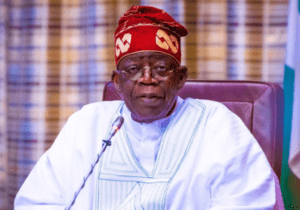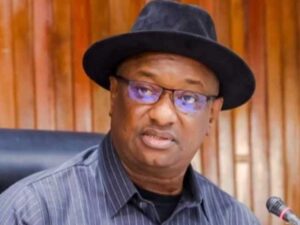
Osun guber election: Why it’s illegal for a Governor-elect to question a sitting Governor
By KOLA OLABISI
There’s nothing that Akpan will not witness at the gate of his master! The series of the latest horrendous happenings in Osun State political sphere today where the governorship election has just been lost and won are scary, strange, disheartening and primitive. The subset of the nation is becoming a geographical expression where the tail is trying to wag the dog instead of the situation to be otherwise.
I have strangely been observing how the Governor-elect Ademola Adeleke has been reeling out policy statements against the sitting Governor Gboyega Oyetola and his administration. I kept on asking through soliloquy if the nation’s constitution has been amended to the extent of giving any definite function to a governor-elect.
My express knowledge of the constitution avails me the opportunity of the fact that there is no iota of function for any governor-elect. Any attempt by any governor-elect to reel out any policy statement can better be described as an overreaching tendency which has no constitutional backing whatsoever.
If the Osun governor-elect in question is lacking in the understanding of the expectations of his new office, one expects his chaperons to be guiding him aright by educating him that there cannot be two governors in a state and that a governor-elect cannot perform the constitutional roles of the substantive governor.
The governor-elect should also know that if at all, it is the wish of God Almighty that he will govern Osun State, the duly elected Governor Oyetola in the 2018 governorship election is not only in charge but he is in absolute control of the administration of the state till November 27, 2022 which is not even sacrosanct as the last process of the election which is the Supreme Court would be the final arbiter.
This is the ground on which Adeleke should tread softly and inform his lieutenants who have been reeling out needless compositions targeted at painting Oyetola and his administration black, to put on their thinking cap by changing over a new leaf as their ventures are unprofitable but monumentally destructive.
One need not be a lawyer to know that Oyetola is constitutionally vested with the statutory powers to run the affairs of the state until the expiration of his tenure. Running and shouting up and down and feeding the innocent members of the public with fallacies about the focused administration of Governor Oyetola by the desperate and bellicose-looking members of the Adeleke team would only be counter-productive.
The way and manner that the Adeleke team is going about the campaign of calumny after election like a man with one scrotum goes a long way to suspect, observe and conclude that they are bereft of the workings of the government.
It is an indication that, may God forbid bad thing to be the lot of Osun, if perchance they get there, the State of the Virtues is in for a big time calamity because of their flagrantly exhibited actions and inactions which expressly qualify them as political vampires.
As I write, there is no provision of the constitution that says that a subsisting governor should be operating at the whims and caprices of the governor-elect. For God sake, the deafening hoopla from the Adeleke end has been worrisome, disturbing and mind-boggling which has no place in the contemporary politics of our time. It has been one composition, one day, from the Adeleke Ede country home which surprisingly, has no iota of substance or an element of truth therein.
Governor Oyetola has the latitude and statutory backing to continue in his usual efforts to give qualitative governance to the people of Osun State. The first of the fallacious propaganda statement effected through stratagem from Adeleke was that Oyetola borrowed N8 billion to fund the last election which was found out to be false as no dime of the state fund was part of the money spent on the election.
If it was true that Oyetola borrowed the money, where is the proof? Or was it that the governor just approached the bank where the said money was borrowed and negotiated orally without signing any verifiable document? This is bullshit and balderdash which corroborated the overburdened saying ‘that talk is indeed very cheap’. It is a simple principle of law that whoever alleges must prove.
Another of the needless outbursts from the Adeleke camp is that Oyetola’s administration is trying to conduct a local government election in the state. Must Oyetola put his government in a state of inertia because someone is parading a proverbial dead sparrow as a certificate of return of a governor-elect?
If I may ask Mr Governor-elect, what brings about the hues and cries on this? Does Ademola Adeleke want to teach Oyetola how to run his government? I beg, this posture amounts to needlessly poking one’s nose in an affair that doesn’t concern one.
If God says he will occupy the seat of a substantive governor in Osun State, Adeleke must patiently wait for his turn as his name as the governor-elect is currently written in pencil. It is a truism that he still has series of judicial hurdles to scale through before he can realize his ambition if it pleases God.
A kite was also flown by the Osun PDP handlers on Wednesday that Oyetola was trying to integrate 10,000 O’YES cadets into the state work force. Assuming but not conceding the veracity and authenticity of the allegation, what is the fear of the governor-elect who had, during the campaign, promised to have sufficient naira, dollar, euro and pound sterling to turn round the state? If it is true that Oyetola is trying to absorb the O’YES cadets, are they not Osun State indigenes?
Don’t they have the inalienable right to be partakers in the eating of the state cake through being legitimate employees of the Osun State government?
Doesn’t Adeleke’s promised Midas touch in government during the campaign not capable of taking care of the state workforce? Why is he pungently jittery? The proverbial head of an elephant is a difficult load for a political Lilliputian!
It would also be recalled that the same Adeleke has been alleging Oyetola of plundering the state since after the governorship election. This allegation succeeded in doing a monumental irredeemable damage to the Adeleke camp as it is seen and interpreted by discerning minds as nothing but an alibi for the imminent failure of his administration, if God destines him to be there.
The rapidity of the turnout of mere compositions against Oyetola and his government by Adeleke has made nonsense of its ulterior motive which has fallen flat due to its metaphorical clay-footedness.
If Adeleke should be taken serious, why has he not been commending the various ongoing road construction projects across the state? An example is Lameco-Ilobu-Ifon rehabilitation/asphalting road where work is progressing both day and night despite the pyrrhic victory of the governorship-elect? No one needs tell a blind man that it is raining, when a drop of it touches his body, he will pick race.
The illegal provocative siren-blaring of the convoy of the governor-elect shortly after the inauguration of his transition team in Osogbo on Wednesday succeeded in exposing him as someone who is only interested in the glamour of the office of the governor at the detriment of the development of the state. If I may ask, what qualifies Governor-elect Adeleke to be using a siren when it’s obvious that such cadre is not known among those legally allowed to do so in this country? This is nothing but the display of a high level of a culture of impunity!
I am convinced beyond reasonable doubt that God is assiduously working in the current political plight of Osun State which necessitates my faith in strongly and stoutly believing that it’s not over until it’s over. Adeleke should learn how to wait patiently for his time if it pleases God to manifest.
OLABISI is the Media Adviser to the Osun State APC chairman



